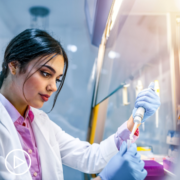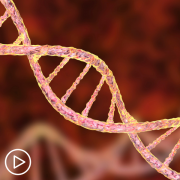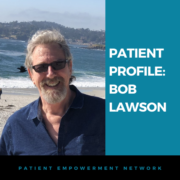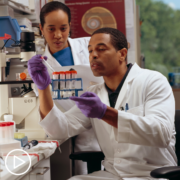Recent Advances in Treating Breast Cancer
Recent Advances in Treating Breast Cancer from Patient Empowerment Network on Vimeo.
What are the latest breast cancer treatment and research advances? Expert Dr. Bhuvaneswari Ramaswamy shares treatment updates for specific breast cancer types and discusses testing for circulating tumor DNA.
Dr. Bhuvaneswari Ramaswamy is the Section Chief of Breast Medical Oncology and the Director of the Medical Oncology Fellowship Program in Breast Cancer at The Ohio State College of Medicine. Learn more about this expert here.
See More from Thrive Breast Cancer
Related Resources:

|

|

|
Transcript:
Katherine:
Are there emerging therapies that are showing promise?
Dr. Ramaswamy:
Oh, my God. There’s just tremendous emerging therapies that are showing extraordinary progress. And I talk about this to my patients all the time. I mean, I tell them like two years ago say in a patient with – patient with metastatic disease, I’ll say, last year this drug wasn’t approved.
This drug is now approved for you to be given, and it shows extraordinary effect. So, every year we have new drugs getting approved, and we are also trying to get it used to be a little bit of a richness on the HER2-positive disease. And now we are seeing definitely a lot of richness on hormone receptor-positive disease. And I think we’re starting to see some new particular immunotherapy and other targeted therapies showing some response in triple-negative breast cancer.
Now, I know that’s a place that we still need to see more newer therapies, but overall, in the stage IV setting, we have really many options to keep them in good quality of life and longer. But people will ask, “Really, why do I even need to get to stage IV?” Really look at me and improve the curative setting. And that again, we are able to pick the higher risk patients, what me – what it means to have higher risk disease, how do we target them, newer drugs to target them. So, I think in so many ways we are doing better. And we are also getting to a place can we detect higher-risk patients, not just by their initial diagnosis and response, but follow them sequentially by circulating tumor cells?
And we are getting to that place where we can actually do circulating tumor DNA, so just isolate the DNA, and we know what will belong to the tumor. And then circulating tumor cells seemingly even after your curative therapy. And so that is something that’s getting approved. And so we are not only seeing treatment, but we are also trying to see better detection of that reference. So, I think we are in so many ways, improving. And I am – I’ve been in this for 20 years, some of the things that thought was a dream is coming true. So, truly just keep living well and keep thriving. There are options.
Katherine:
Yeah. That’s, it’s positive.
Dr. Ramaswamy:
Yes.










